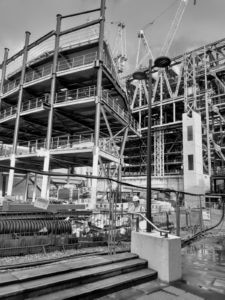Ik heb mij vaak verzet tegen het denken aan Nederland als een onderneming. Een land kan immers geen mensen ontslaan, of onrendabele sectoren afstoten om meer winst te maken. Iedereen die dus spreekt van de BV Nederland heeft het niet begrepen. Er zijn geen concurrenten die je al ondernemend de markt uit kunt vechten op die paar vierkante kilometer polderland, waar we met zijn allen op wonen.
Het neemt niet weg dat je wel kunt plannen als een ondernemer. Iedereen die hier werkt, weet dat je, voor je ergens aan begint, een ondernemingsplan moet maken: hoe uniek ben je, hoe ga je overleven, hoe ga je blijven, hoe ga je groeien? Kunstenaars moeten dat ook, al is er vaak nog een flinke kloof tussen de eisen voor een subsidie-aanvraag en het standaard ondernemingsplan. Zoals in een vorige aflevering van deze serie al gesteld: met een ondernemingsplan kun je ook gaan spreken van (permanente) investeringen, in plaats van subsidie.
Tienjarenplan
Wie het ook nog niet helemaal doorhebben, zijn lokale overheden. De regionale visies die Nederlandse stedelijke regio’s vorig najaar moesten produceren barsten misschien van de ambitie, maar staan ook vol met gemeenplaatsen, en de verplichte woorden die het ministerie nu graag gebruikt ziet worden: inclusie, diversiteit, spreiding, bereik. En omdat het subsidiesysteem ondertussen niet echt aangepast is op een regionale focus, blijven het dode letters. Nog steeds wordt in Nederland de koek bizar verdeeld: lokaal gesubsidieerde gebouwen bieden onderdak aan vooral landelijk geselecteerd aanbod.
De gemeenteraad van Manchester, volledig in handen van Labour sinds mensenheugenis, maakt, naast de gewone collegeplannen, ook tienjarenplannen. Voor continuïteit over de waan van de verkiezingen heen. Dat is misschien de luxe van het tweepartijenstelsel: de kans is klein dat in Manchester ooit een conservatieve meerderheid ontstaat. Toch, ook in een van losse coalities aan elkaar hangend land als Nederland zou een gemeenteraad zoiets moeten kunnen.
Wat wil Manchester?
Ze hebben een redelijk simpel lijstje, door iedereen te begrijpen en handzaam in elk gesprek:
- zorg dat de stad bekend wordt met onderscheidend werk dat alleen hier kan zijn ontstaan;
- maak van deze stad de meest cultureel democratische stad van het land, die een veel grotere diversiteit aan mensen bereikt over de hele stad.
- laat Manchester bekend staan als een stad die creatieve talenten waardeert en voedt, en vaardigheden en uitdrukkingen genereert die inclusiever en succesvoller zijn dan waar ook ter wereld.
Nu zou je kunnen zeggen: dat kan iedere ambtenaar bedenken, maar zo werkt het niet in Manchester. Elke culturele instelling die we bezochten deed zijn uiterste best ons te vertellen hoeveel moeite ze deden om aan de uitgangspunten te voldoen. Uitgangspunten, die dus niet voor een paar jaar gelden, maar voor minstens 10 jaar.
Austerity
En dan nog: de gemeente geeft het goede voorbeeld. Toen in de crisisjaren de Tories landelijk de beruchte ‘austerity’ uitriepen (en daar Europa de schuld van gaven, wat weer tot de Brexit leidde), besloot Manchester het anders te doen. Trouw aan de hierboven geschetste visie stak de stad miljoenen in culturele projecten. Grootste project: het Manchester International Festival, dat elke twee jaar gehouden wordt. De eisen waren simpel: alleen wereldpremières van uniek werk, dat alleen in Manchester gemaakt kan worden, en alleen wereldtop. Het werkte, en werkt nog steeds. Inmiddels staat MIF in de eredivisie van internationale topkunst.
Om het succes duurzamer in de stad te vestigen heeft de gemeenteraad vervolgens besloten het festival een permanent gebouw te geven. Een festivalfabriek waar zowel geproduceerd als gepresenteerd kan worden. Multifunctioneel en groot genoeg om zelfs de meest megalomane plannen van de grootste kunstenaars ter wereld te kunnen toelaten.
Peppercorn

Het gebouw wordt gigantisch: denk aan de beroemde Jahrhunderthalle in Bochum, maar dan een maat groter, en luxer. De fabriek, Factory genaamd, naar de beroemde club die ooit een paar blokken verder de Manchester muziekscene voortbracht, is ontworpen door onze eigen OMA (Rem Koolhaas) kost een slordige 180 miljoen en ligt op schema. En wie mocht denken dat het hier, net als in Nederland, om een lucratieve vestzak-broekzakconstructie gaat, waarbij de gemeente het gebouw verhuurt aan de gebruikers, en zo – via de subsidie waar de gebruikers de huur mee betalen – de eigen vastgoedafdeling financiert, heeft het mis. Dat is het zuinige ondernemerschap waarmee Nederland tegenwoordig zo goed klein blijft.
Manchester verhuurt het gebouw aan het festival, dat wel, maar de huurprijs is een zogenaamde ‘peppercorn’: MIF betaalt 1 pond per jaar huur. De gemeente blijft eigenaar en draait op voor het onderhoud.
Verbondenheid
Zo leer je weer eens dat we ons misschien onterecht op de borst kloppen over de riante subsidies die Nederlandse overheden over hebben voor de kunsten. Ongeveer een derde deel van die subsidie vloeit bij ons terug in de vorm van huur en onderhoud. Wat er in de UK aan peppercorns wordt uitgedeeld, loopt in de honderden miljoenen per jaar. Daar kan Nederland niet aan tippen.
Wat het ook veroorzaakt: een innige verbondenheid tussen lokale overheid en de kunstsector. Dat zouden wij in Nederland wellicht teveel van het goede vinden. Er kleven natuurlijk ook nadelen aan. Maar de voordelen wegen daar tegenop: nergens anders dan hier in Manchester zag ik zoveel trots op de eigen stad, bij kunstenaars én bestuurders.
Of, zoals de Leader of the Council van de Greater Manchester Area het kernachtig uitdrukte: ‘We hebben betrokken burgers nodig om onze economie te onderhouden. Mensenn komen hier niet om te skieën. Mensen moeten hier willen wonen. Wie wil er nou leven in een stad zonder cultuur?’
Verstop de boeken, als je volk in de bieb wil hebben. (Lessen uit Manchester, aflevering 2)
